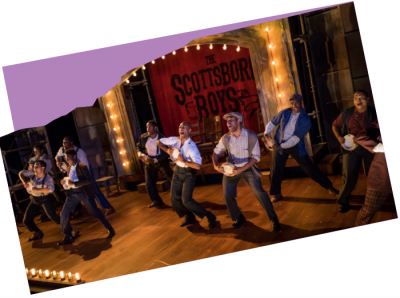Your donation sets the stage for a new season of Boston's most intimate, entertaining and provocative plays and musicals. Our shows make powerful connections with our audiences-- and they are only possible because of you.
An Interview With Nicky Silver
An Interview With Nicky Silver
 Kurt Vonnegut couldn’t make up his mind. He left behind eleven different drafts of his play Make Up Your Mind, and if it was ever going to make it to the stage, then a few decisions had to be made. Enter Broadway playwright Nicky Silver, author of Pterodactyls and The Lyons, who was brought on as an “assembler” for the play and tasked with bringing Vonnegut’s vision together into a single unified event. SpeakEasy Artistic Associate Walt McGough spoke with Mr. Silver about the process of putting together the play, and how he connected with a writer who, on first look, was very different from himself.
Kurt Vonnegut couldn’t make up his mind. He left behind eleven different drafts of his play Make Up Your Mind, and if it was ever going to make it to the stage, then a few decisions had to be made. Enter Broadway playwright Nicky Silver, author of Pterodactyls and The Lyons, who was brought on as an “assembler” for the play and tasked with bringing Vonnegut’s vision together into a single unified event. SpeakEasy Artistic Associate Walt McGough spoke with Mr. Silver about the process of putting together the play, and how he connected with a writer who, on first look, was very different from himself.
How did you get involved with this project?
I got a call from my agent saying, “Someone wants to meet with you about working on this Kurt Vonnegut play that he apparently left unfinished.” I hadn’t read anything by Vonnegut since I was in high school, but a very dear friend of mine, whom I adore beyond words, loves Vonnegut. So I thought, “I’ll go and I’ll find out what it is.”
Were you given all of the drafts at once?
Well, first I got one script, and I immediately saw both potential and problems in it. Even in that one script, I could tell that there were annotations and scenes inserted from other drafts. I agreed to do it, and then one day I got delivered to my apartment a big box with a lot of drafts [laughs].
How different were the various drafts?
The premise was always the same. The ending changed dramatically, and each scene did as well, but it was also very consistent in many areas. I drew mostly from about four or five drafts while I was working; but every now and then, I would remember having seen something in a different draft, and I would have to go hunt for that particular piece of information.
Were you allowed to add anything else?
I had permission from the Vonnegut estate to use other material of his if I needed it. And so I read a lot of other Kurt Vonnegut, including all of his essays and the book of letters that came out last year. Those were the things that influenced me the most, really, because they made me care about him as a person.
Was there something in particular that made you feel that way?
No, it was all of it. The letters in their totality gave a sense of humility, and of an artist struggling, which I related to very very much. Granted, for me to relate to Kurt Vonnegut is like a little kid in Iowa relating to Meryl Streep. I am not on any Barnes & Noble t-shirts. I don’t mean that I saw him as a peer; he was an important legendary literary figure and I’m an upstart playwright. But writers’ lives are surprisingly similar when you read about them. If you read Joe Orton’s diaries or Noel Coward’s letters or Kurt Vonnegut’s letters or Truman Capote’s diaries, you’d be surprised at how similar the emotional journey is for the writer.
So it was your decision to make him a character in the play?
Yes, but using his words. The Vonnegut character is unedited. With the exception of intros and outros, the bulk of what he has to say is verbatim what he had to say.
Why did you feel that was so important?
It felt somehow disingenuous to put Kurt Vonnegut on the stage and put words in his mouth that were not his, or edit them to any vast degree. Where I felt freer to do that with other characters, I didn’t do that with his character. Characters of mine very often have opinions that are different from mine, so I can safely assume that characters of Vonnegut’s have different opinions from Kurt Vonnegut. But if Vonnegutwas the character, I didn’t want him to get up there and espouse ideas that were not his. He was now a character and it didn’t seem fair to him. And I liked him by that point.
What did the process of assembling the play look like? Were you starting with a blank page, or pulling things together from all the drafts?
Very much pulling. When I turned in the first draft to the producers, there was a very long annotated appendix to the draft, and it notated every single change, where it came from—if I needed something I would go and find something in the drafts, rather than creating something from whole cloth. There was a lot of editing, but very little creation at that point. There are a couple of instances in the play where something is created, but those are notated as well. So I could say, “Yes, I’ve had to add this phone call here, because of reality and the needs of the scene, but you’ll see that most of that phone call existed on page 42 of this draft and page 72 of that draft…so I’ve taken those pieces and edited them together where they needed to be.”
Now that you’ve spent all this time with him, what do you think brought Vonnegut to writing for theatre?
I don’t think it was a particular passion for the theatre, specifically; I think it was a passion for human beings. Writing a novel is an extremely lonely process, but theatre is extremely communal. That isn’t to say he didn’t love the theatre, but I don’t think he said to himself “I want to sit at a table with David Rabe and David Mamet and David whoever…” I can’t think of another David. I think he wanted to be among people. I understand that, 100%. I go to every rehearsal and every performance but the matinees. I am part of the family with the actors; if it’s a big bomb, which I’ve had, then it’s very important that the actors not feel abandoned. And if it’s a big hit, which I’ve had, then you want to be there to see what famous people think and hear the audience cheer and stand [laughs]. It works out either way; I’m still there. I think that’s why he wanted to be in the theatre.
Do you see any other parallels between yourself and Vonnegut?
At first glance, no, because he was such a vastly different person from me. He was heterosexual and I’m homosexual, he was a novelist primarily and I’m a playwright, he’s dead and I’m alive…but there is a sensibility, an idea, that the most exciting thing about writing a play is that you turn the page and really anything can happen. Your limitations are only the limitations of your imagination and the physical space, and there’s usually ways around the limitations of the physical space. That disregard of the conventional rules of playmaking, I think, is what made me not a terrible choice and what created an affinity between myself and himself. And I think his approach to novels is similar to that. There are those Greek rules of how to write a play, and he didn’t follow them, didn’t have much interest in them. He acknowledged that we’re in a space telling a story to a group of people, and that is something that I feel very familiar and comfortable with.
— Walt McGough
 Past Productions
Past Productions LAUGHS IN SPANISH
LAUGHS IN SPANISH PRU PAYNE
PRU PAYNE ain't no mo'
ain't no mo' a man of no importance
a man of no importance JAJA’S AFRICAN HAIR BRAIDING
JAJA’S AFRICAN HAIR BRAIDING




